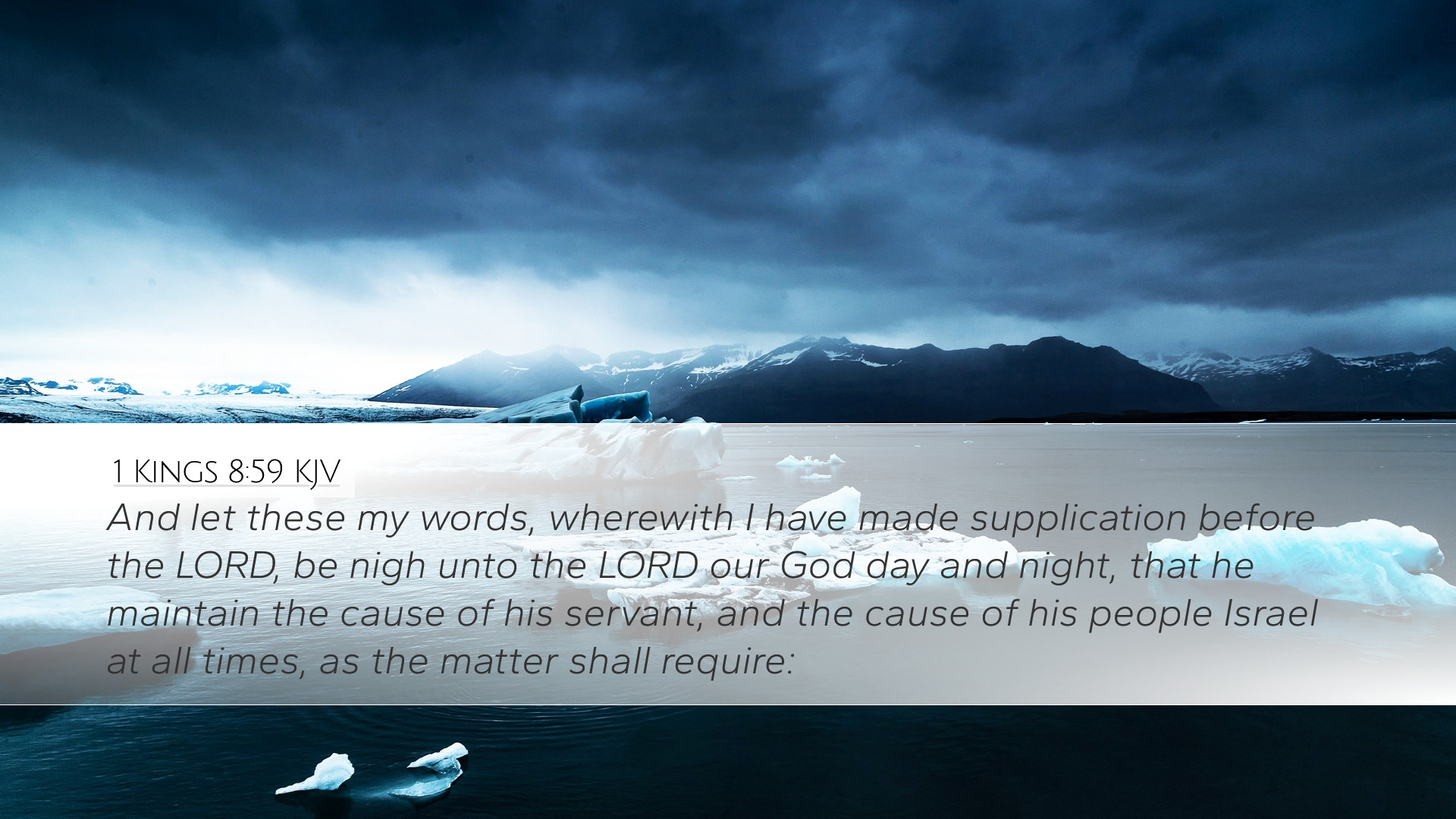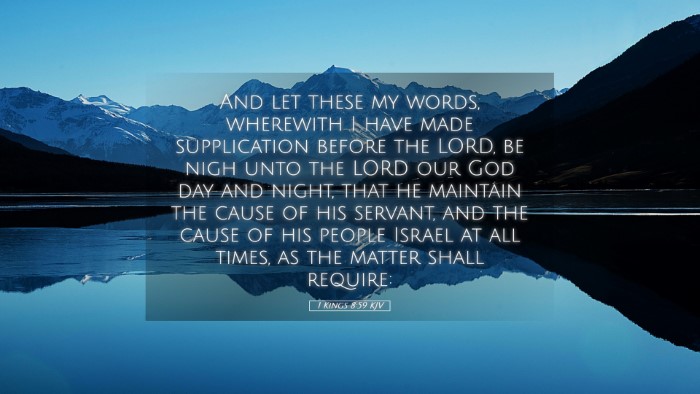Commentary on 1 Kings 8:59
Verse Analysis: 1 Kings 8:59 reads, "And may these words of mine, with which I have made supplication before the Lord, be near to the Lord our God day and night, that He may maintain the cause of His servant and the cause of His people Israel, as each day requires." This verse concludes Solomon's dedicatory prayer at the temple, underscoring the ongoing relationship between God, His servant (Solomon), and the people of Israel.
Contextual Background
The dedication of the temple marks a significant milestone in Israel's history, where a central place of worship was established. Solomon, as the son of David, recognized the importance of dedicating this hallowed space to the Lord. Here, he explicitly expresses his hope that God remains attentive to the prayers offered, indicating the theological foundation for continued communal prayer and supplication.
Theological Significance
This verse encapsulates several theological themes that are critical for biblical scholars and pastors alike:
- The Importance of Prayer: The request for God to be near signifies the essentiality of prayer in the life of faith. Prayer is not merely a ritual but a vital communication channel between God and His people, reinforcing the personal relationship that believers are encouraged to cultivate.
- Divine Accountability: Solomon implores God to 'maintain the cause' of His servant and people. This reflects the acknowledgment that both leaders and the community are dependent on God's fidelity to His covenant. It highlights a mutual responsibility; while God must act, there is an expectation of loyalty and obedience from His people.
- Ongoing Relationship: The notion that the words should be near to God "day and night" emphasizes the continuous nature of this divine relationship. Solomon's prayer embodies a persistent appeal for God's intervention and support throughout the days, implying that the life of faith should be characterized by continual reliance on God.
Insights from Commentaries
Matthew Henry's Commentary
Matthew Henry notes the significance of Solomon's prayer in its earnestness and continuity. He emphasizes that Solomon's desire for God's attention implies a deep recognition of God's sovereignty and grace. According to Henry, the "words" mentioned are not just for the occasion but are meant to encapsulate the pleas of Israel over time. His commentary encourages readers to engage in prayer with similar fervor and earnestness for God’s guidance and support.
Albert Barnes' Notes on the Bible
Barnes elaborates on the phrase “the cause of His servant and the cause of His people.” He stresses the idea of justice and righteousness in leadership. Solomon's prayer reflects a leader’s burden to seek God’s will and the welfare of the nation. Barnes also suggests that there is an implicit understanding of God's character as just and merciful, which fosters a level of trust that invites the people to turn to God for their needs.
Adam Clarke's Commentary
Clarke emphasizes the communal aspect of the prayer. He posits that Solomon is not only praying for himself but for all Israel. His plea encapsulates the collective needs and aspirations of the people as they enter a new era with the temple at the center of their worship. Clarke also notes the significance of “day and night” in covenantal faith, indicating God's undying faithfulness and the need for constant devotion from His people.
Practical Application
The themes derived from 1 Kings 8:59 provide multiple avenues for practical application in contemporary ministry and personal spirituality:
- Encouragement of Constant Prayer: Believers are called to embody a spirit of continuous prayer, recognizing that their struggles and supplications are always relevant to God’s ears. This verse challenges pastors to cultivate a prayer-focused church environment.
- Leadership with Accountability: Church leaders should be aware of their responsibility to seek God's guidance for themselves and for the communities they serve. Acknowledging God's sovereignty allows leaders to lead with humility and integrity.
- Community Engagement: The prayer reflects a broader communal need, urging believers to engage not only personally but also corporately in seeking God’s will for their lives and community at large.
Concluding Thoughts
In summary, 1 Kings 8:59 serves as a resonant reminder of the importance of prayer, divine reliance, and communal accountability in the life of faith. The insights gleaned from respected commentaries reflect a deep and rich understanding of this verse, making it essential for anyone studying the Word. As we engage with Scripture, may we embody the spirit of Solomon’s prayer, seeking God earnestly for the needs of His people, both today and always.


